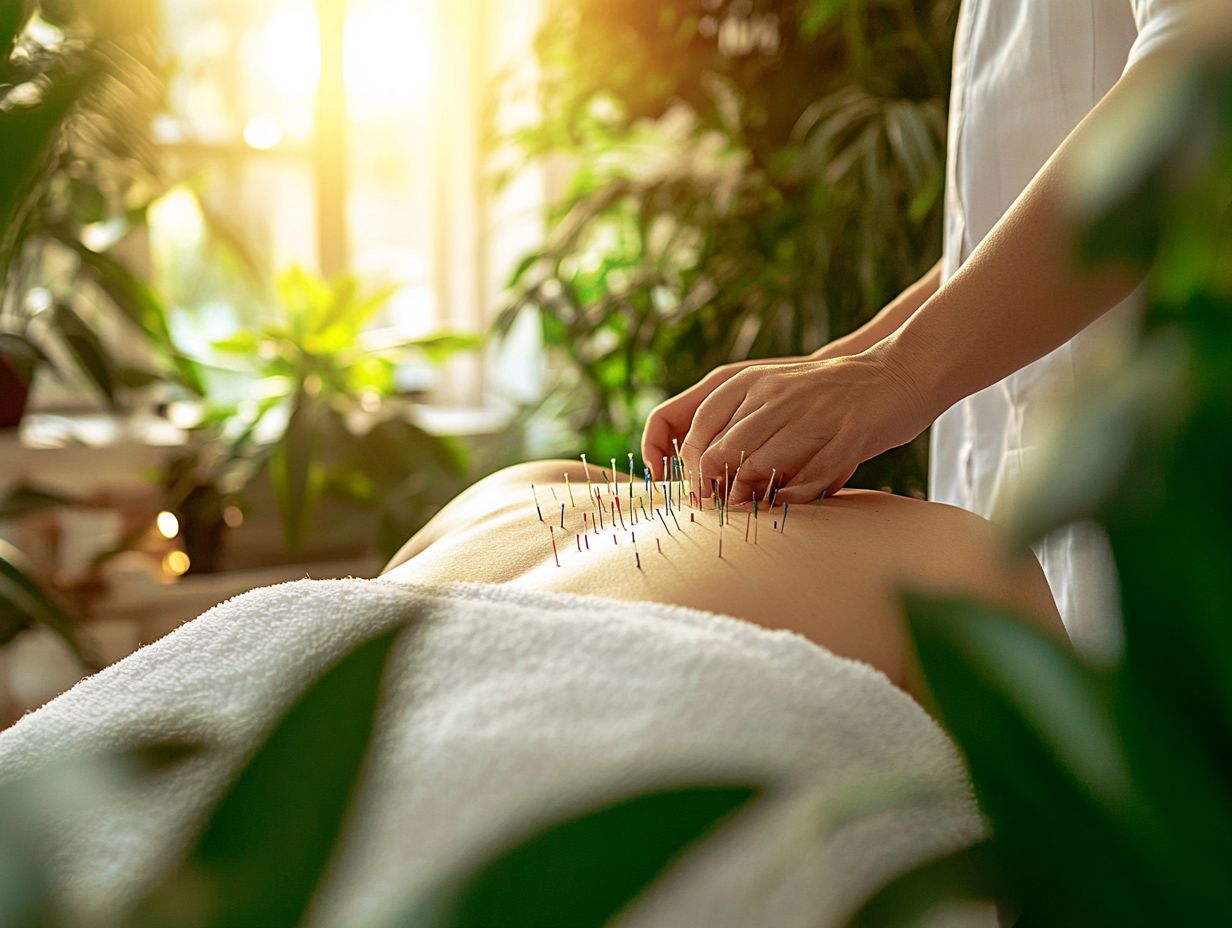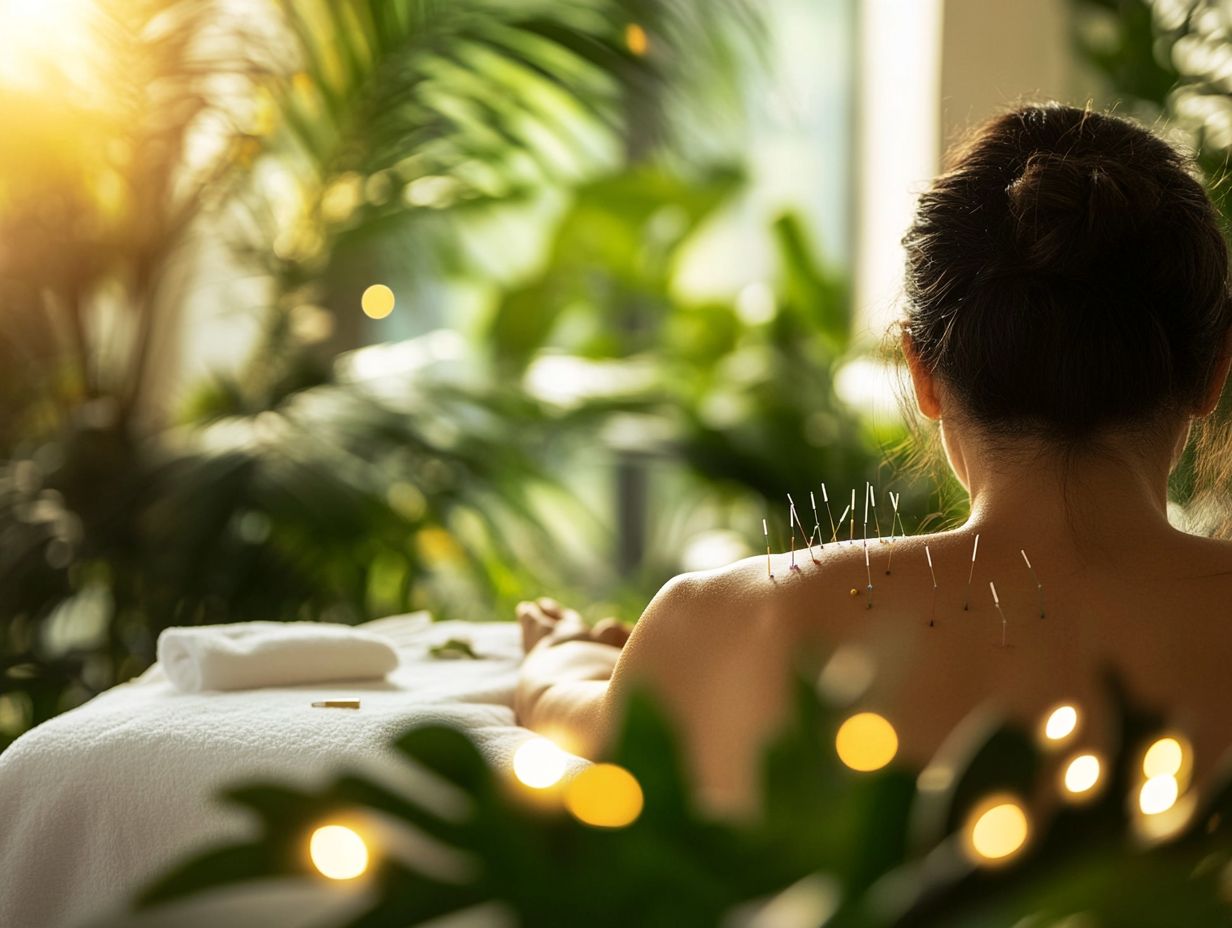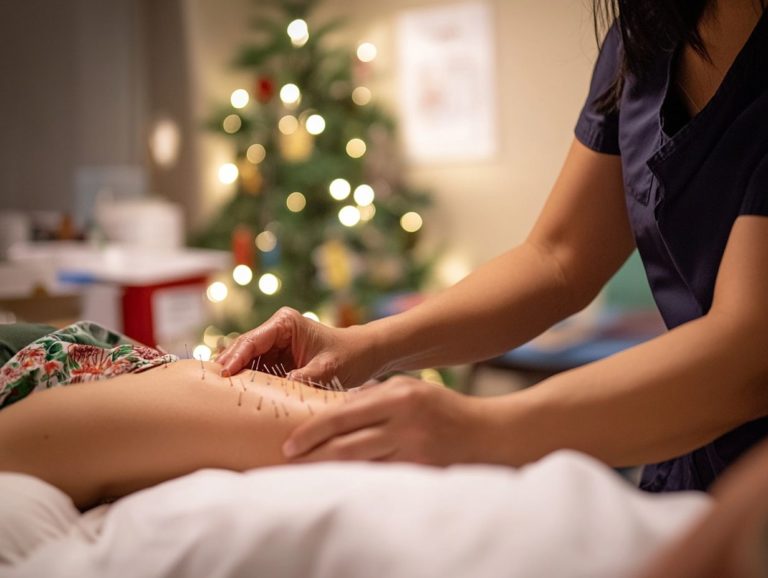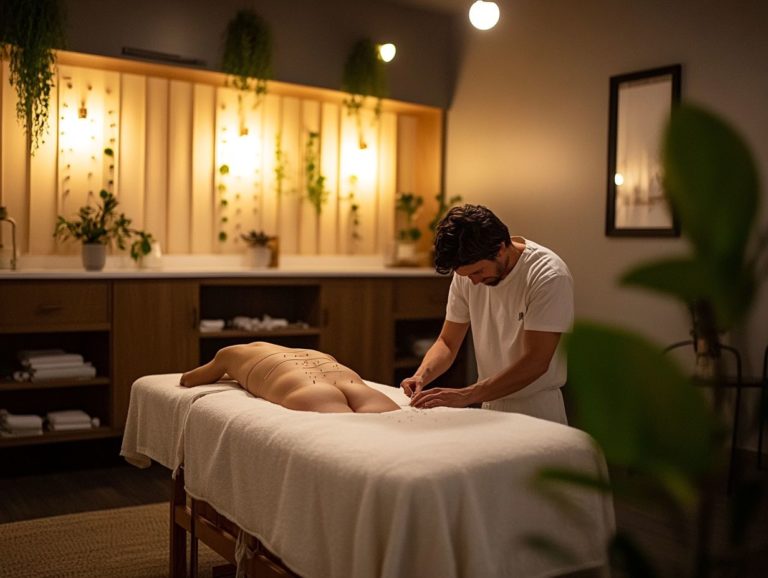How Acupuncture Can Help with Seasonal Allergies
Seasonal allergies can be a frustrating challenge, with symptoms that may include sneezing, congestion, fatigue, and pesky headaches.
Traditional treatments might help you, such as medications and allergy shots, while alternative methods like acupuncture are gaining popularity for their potential benefits.
This article explores the causes and symptoms of seasonal allergies. It examines conventional treatment options and highlights how acupuncture could offer a holistic approach for relief.
You ll also discover other natural remedies and lifestyle changes to help you breathe easier this allergy season.
So, dive in to uncover effective ways to reclaim your comfort and well-being!
Contents
Key Takeaways:

Acupuncture can provide relief for seasonal allergies by targeting specific points in the body that help reduce inflammation and boost the immune system.
Unlike medications, acupuncture has minimal side effects and can be a natural alternative for those seeking relief.
Along with acupuncture, incorporating supplements and lifestyle changes can also help alleviate symptoms. It’s important to consult with a licensed acupuncturist for personalized treatment plans.
Understanding Seasonal Allergies
Seasonal allergies, often called seasonal allergic rhinitis, affect millions globally, especially during peak pollen seasons when allergenic trees release a torrent of pollen into the air.
You may battle a range of symptoms, from nasal congestion to sneezing and itchy eyes, as your immune system reacts to allergens like pollen from grasses, weeds, and trees.
Understanding the causes, symptoms, and potential health issues related to seasonal allergic rhinitis is essential for effectively managing and treating this condition.
Causes and Symptoms
The main causes of seasonal allergic rhinitis stem from exposure to allergens such as pollen from trees, grasses, and weeds, which can trigger an immune reaction if you’re susceptible.
As your body encounters these allergens, it activates specific immune pathways, leading to various physiological symptoms. You might experience nasal congestion, frequent sneezing fits, and itchy, watery eyes.
These symptoms occur due to the release of chemicals in the body that help control inflammation. While moderate seasonal allergic rhinitis may cause discomfort, severe cases can significantly impact your quality of life, leading to persistent fatigue and affecting daily activities.
Traditional Treatment Options for Seasonal Allergies
Traditional treatment options for seasonal allergies primarily include medications and allergy shots, both designed to relieve symptoms and enhance overall well-being.
These approaches are backed by various treatment plans rooted in clinical studies, ensuring you receive effective, evidence-based care tailored to your needs.
Medications and Allergy Shots

Medications for seasonal allergic rhinitis, such as antihistamines and nasal corticosteroids, are often prescribed to help manage symptoms and enhance treatment effectiveness. These treatments specifically target pathways involved in your allergic response.
Antihistamines work by blocking histamine, the chemical released during an allergy flare-up that causes sneezing, itching, and congestion. Nasal corticosteroids reduce inflammation in your nasal passages, providing relief from swelling and mucus production.
While effective for many, there may be potential side effects, like drowsiness from antihistamines or nasal irritation from corticosteroids.
If you re looking for long-term relief, consider allergy shots, also known as immunotherapy. These shots gradually introduce doses of allergens to your system, helping your immune system build tolerance, which can be beneficial for persistent symptoms.
Call to Action: Explore these treatments further or consult a professional to find the best relief for your seasonal allergies!
How Acupuncture Can Help
Acupuncture is an ancient practice rooted in Eastern medicine. It has become a popular complementary treatment for seasonal allergies.
Numerous clinical studies underscore its effectiveness in reducing allergic symptoms, making it a compelling option for those seeking relief.
Theories Behind Acupuncture’s Effectiveness
The effectiveness of acupuncture in treating seasonal allergic rhinitis can be attributed to its remarkable ability to modulate your immune system. This includes influencing immune system chemicals and promoting the growth of cells that fight allergies.
This ancient practice also aims to restore balance within your body. Research has identified specific acupuncture points like LI4 (Hegu) and ST36 (Zusanli) as particularly effective for alleviating allergy symptoms.
By stimulating these points, practitioners enhance your circulatory and immune functions while reducing inflammation. Modern theories suggest that such interventions can decrease histamine release and boost regulatory T-cell production, essential for managing allergic reactions.
If you’re looking for effective ways to manage allergies, acupuncture could be the key! This treatment beautifully combines traditional wisdom with contemporary insights into the immune system.
Specific Acupuncture Points for Allergy Relief
Specific acupuncture points have been identified as especially effective in alleviating nasal symptoms associated with seasonal allergic rhinitis. Targeting these points significantly enhances treatment efficacy and patient outcomes.
Points like LI4 (Hegu) and LU7 (Lieque) are renowned for their ability to boost your immune system and relieve congestion.
By focusing on these areas, practitioners assist your body in naturally combating symptoms of allergic rhinitis, such as sneezing, itching, and nasal discharge.
Various acupuncture techniques like needling, heat therapy, and electroacupuncture can further amplify these effects. Each method stimulates circulation and promotes healing, allowing for greater relief from nasal discomfort over time.
This holistic approach aims not merely to treat symptoms but to offer lasting solutions that elevate your quality of life.
What to Expect During an Acupuncture Session

During an acupuncture session, you can expect a carefully structured process aimed at fostering relaxation and alleviating allergic symptoms.
Your practitioner will inform you about any potential side effects related to the therapy, ensuring you have a complete understanding of what to expect.
Process and Potential Side Effects
The process of acupuncture involves inserting thin needles into specific points on your body. While it’s generally safe, there are a few potential side effects to be aware of.
Before you begin, your practitioner will conduct a thorough consultation to understand your health history and specific concerns. They ll create a clean and comfortable environment, guiding you into a relaxed state.
During the session, gentle techniques are used to insert the needles, often followed by slight angle adjustments to enhance effectiveness. After the treatment, you might feel mild soreness or notice slight bruising, but these effects are usually temporary.
Safety measures are paramount your practitioner will use sterilized, single-use needles and follow strict hygiene protocols to minimize risks throughout your acupuncture experience.
Other Natural Remedies for Seasonal Allergies
Exploring alternative natural remedies for seasonal allergies provides a holistic approach to managing your symptoms.
When combined with conventional treatments and thoughtful lifestyle changes, these remedies can significantly enhance your overall well-being and improve your health outcomes.
Supplements and Lifestyle Changes
Supplements like omega-3 fatty acids and quercetin, paired with positive lifestyle changes, can greatly improve your immune system and alleviate health issues tied to allergic reactions.
These nutrients are celebrated for their anti-inflammatory properties, helping to temper your body s overreactions to allergens. Omega-3s, found in fatty fish and flaxseeds, work to reduce the production of inflammatory substances. Quercetin, a potent antioxidant present in apples and onions, may stabilize cells that release chemicals during allergic reactions and curb histamine release.
Boost your well-being with regular exercise and a colorful diet abundant in fruits and vegetables. Staying hydrated can also strengthen your immune response, and managing stress perhaps through yoga or meditation can equip your body to better withstand allergens.
Frequently Asked Questions

What is acupuncture and how can it help with seasonal allergies?
Acupuncture is a traditional Chinese medicine practice that involves inserting thin needles into specific points on the body to stimulate the flow of energy. This can help reduce allergy symptoms by promoting overall balance in the body and strengthening the immune system.
What are the common symptoms of seasonal allergies that acupuncture can help with?
Acupuncture can help alleviate symptoms such as sneezing, runny nose, itchy eyes, congestion, and sinus pressure, which are commonly associated with seasonal allergies.
How does acupuncture differ from other treatments for seasonal allergies?
Unlike allergy medications, which provide only temporary relief, acupuncture treats the root cause of allergies by addressing imbalances in the body. It also has fewer side effects compared to medication and can provide long-term relief.
How many acupuncture sessions are needed to see results for seasonal allergies?
The number of acupuncture sessions needed depends on the individual and the severity of their allergies. Some people may experience relief after just one session, while others may require several sessions to see significant results.
Are there any potential risks or side effects associated with using acupuncture for seasonal allergies?
Acupuncture is generally considered safe when performed by a licensed and trained practitioner. However, some people may experience mild side effects such as bruising or soreness at the needle insertion site. It is important to discuss any concerns with your acupuncturist before beginning treatment.
Can acupuncture be used in conjunction with other treatments for seasonal allergies?
Absolutely. Acupuncture can be used safely in combination with other treatments such as allergy medication, herbal remedies, or nasal sprays. It can also help enhance the effectiveness of these treatments and provide additional relief for allergy symptoms.






